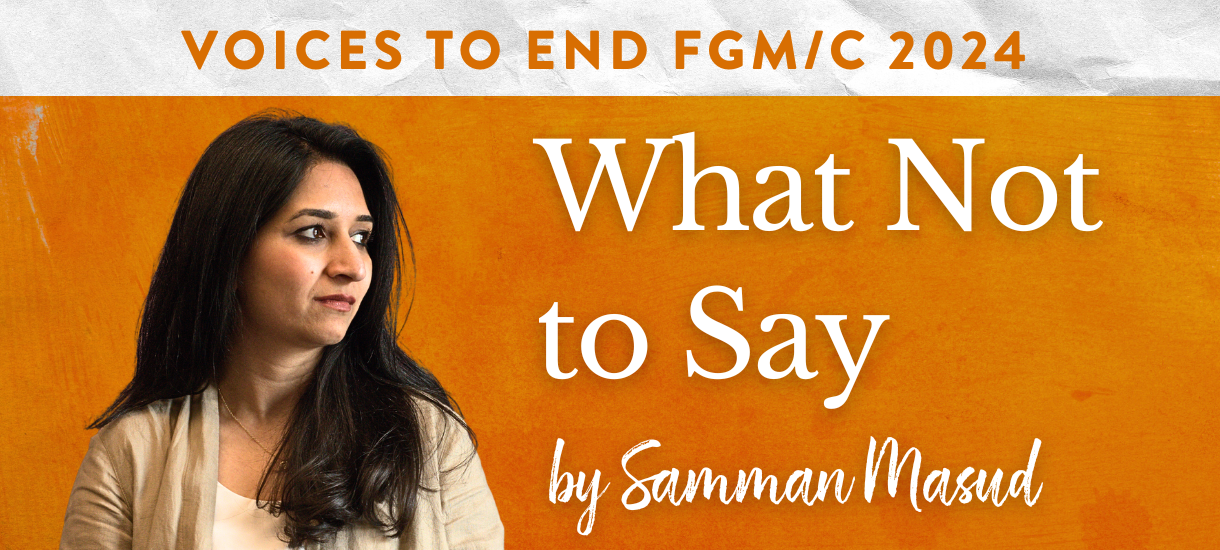By; Samman Masud
In this digital short film, “What Not to Say”, I wanted to take the opportunity to talk about the experiences and conversations I had with my community members around the time I gave birth to my two wonderful daughters. To some, these experiences would not necessarily qualify as microaggressions, nor are they typical cases of gender-based violence, but these discourses warrant a much needed conversation and intervention within the Pakistani and South Asian community at large, where misogyny and patriarchal norms are alive and well.
In this film I discuss the discomfort I felt when some friends or distant relatives made comments about my second child being yet another daughter. “Do you think it’s going to be a boy this time?” and “Are you going to try for a boy next time?” were questions passed to me very nonchalantly, and although they were meant to be and might even seem like harmless little exchanges, in reality they have the potential for some far reaching and serious implications for women and girls already living in a world laden with gender-based violence. These casual conversations that dismiss the birth of one’s daughter have even bigger impacts in South Asian communities, where the normalization of such denigrating language against an already marginalized group can worsen their conditions, if not change them for the better.
We know that the preference for male children throughout societies in the international community stems from various religious, cultural, socio-economic realities, but the progress made over the years in the women’s right to work which gave them financial autonomy is shifting the tide and conversation around son-preference, somewhat, as I’ve noticed in my close circle and amongst families of my relatives in Pakistan. A completely accurate analysis of the current global trends in this practice could only be assessed through an in-depth qualitative and quantitative study that I’d love to undertake one day. Yet, despite the progress made in women and girls’ conditions around the world, cultural practices like son-preference remain deep-rooted, difficult to eradicate and have grave consequences for women and girls.
I believe that the first step to protecting women and girls can begin at home, where we can disrupt the slightest, subtle conversations that give preferential treatment to male children and men. The opportunity to participate in this storytelling workshop allowed me to discuss this topic that may not seem harmful at the outset, but is in fact part and parcel of the larger problem of gender-based violence. I am lucky to have grown-up in a family where my sister and I were loved and treated equally as our brother, and so was the case for my cousins and friends. But growing up within a South Asian community, I could not ignore the prayers and blessings women gave to expectant mothers about giving birth to a son. I had heard of secret abortions of girl children that took place in India and Pakistan, but a women and gender studies course that looked at an in-depth study of sex-selective abortions among college educated Indian American women in the U.S. blew my mind. Of course I had seen gut-wrenching documentaries with the disturbing stats on the number of girls missing from the world due to the infanticide and femicide epidemic across rural populations. But this revelation of educated women’s preference for sons due to whatever socio-economic backdrops and discourses around feminist agency reasoning was eye-opening.
So during my second pregnancy, I wasn’t surprised when some educated women around me casually asked whether I would try for a boy next time. I’ve learned through these exchanges that degrees from institutions do little to disrupt archaic ideas through which practices like gender-based abortions, or female genital cutting are allowed to continue. Instead, community education and public awareness can bring incremental change and eventually end them. This workshop allowed me to do just that and hopefully will raise awareness about an issue through a storytelling medium that truly has a transformative potential and one I love so much.
Samman Masud serves as the Community Engagement Coordinator at Sahiyo, where her responsibilities include overseeing the Activists Retreat Program and spearheading the male engagement initiative focused on educating and raising community awareness about female genital cutting. Her background features extensive engagement in human rights advocacy, including roles within the strategic communications department and participation in human rights for youth campaigns at Amnesty International USA. Samman holds a B.A. in Political Science and a Master’s in Human Rights and Women & Gender Studies, reflecting her deep academic and practical interest in advancing gender equality and human rights.

